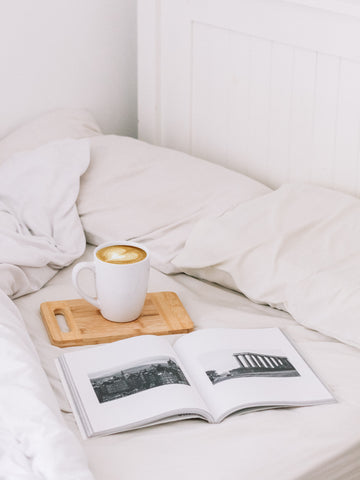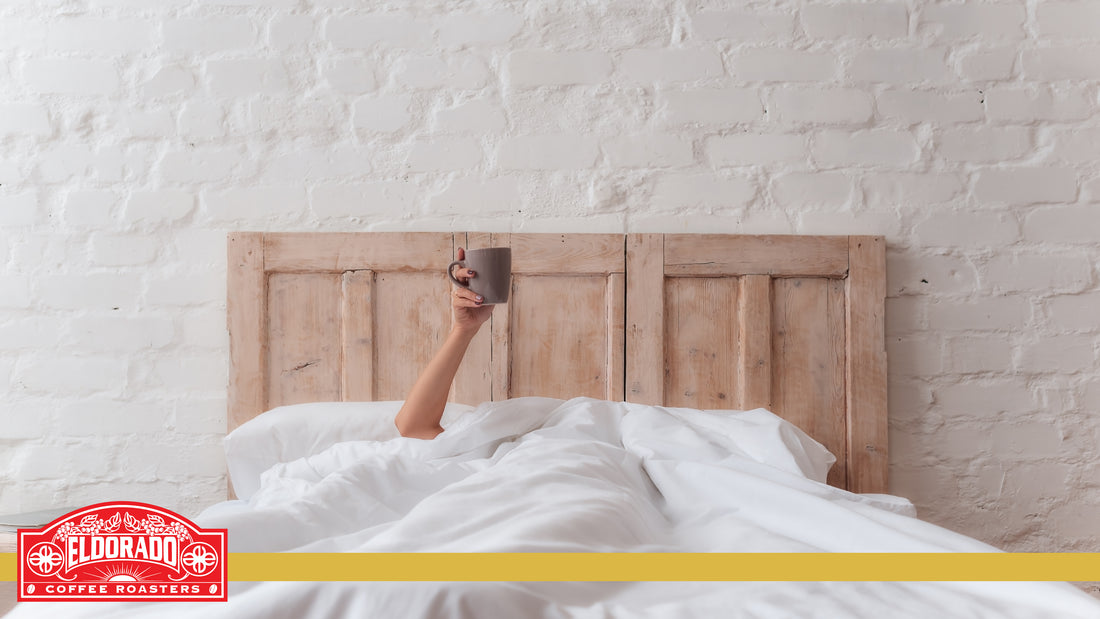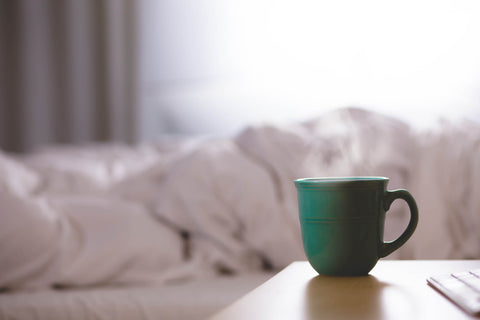Is your daily cup of coffee impacting your sleep? It’s possible. Coffee contains caffeine, which has proven impacts on sleep length, quality, and ability to fall asleep.
But you don’t have to give up coffee to get a good night’s sleep. Coffee isn’t the enemy. There are a lot of health and lifestyle benefits that come with drinking coffee. You simply need to understand the potential caffeine effects on your sleep, so you can take the appropriate steps to negate them.
In this article, we’re going to go through everything you need to know about how caffeine affects your sleep, and what you can do about it to enjoy quality coffee and quality sleep.
What is caffeine?
Caffeine is a natural stimulant extracted from coffee, tea, and cacao plants. (Caffeine can also be made synthetically, for energy drinks.) A “stimulant” basically means it stimulates your brain and body on a physiological level.
In moderate doses, caffeine’s stimulating effects can positively increase alertness, mood, and mental performance. But, this stimulation is also what can make it challenging for your mind and body to relax enough to sleep.
We’re going to talk about the “lifespan” of caffeine first, then get into a little bit of the science behind how caffeine actually wakes us up, and makes us feel more alert.
How quickly does caffeine hit your system?
When you drink coffee, the caffeine finds its way to the bloodstream, through the stomach and small intestine. This process takes about 15 to 20 minutes, so you’ll start feeling the alert and stimulating effects of caffeine quickly.
The caffeine hits its peak levels within 30 to 60 minutes. That means, if you want to best utilize the stimulating effects of caffeine, you’ll want to plan to do your best work about an hour after consumption.
How long does coffee keep you awake?
How long does caffeine stay in your system? Studies show that the half-life of caffeine is about five to six hours. This means it takes your body five hours to eliminate half of the caffeine you consumed.
It takes your body even longer to process the remaining half of the caffeine. In fact, it can take your body up to 24 hours to process the rest.
Your body’s ability to process caffeine depends on a number of factors, though. If you don’t drink caffeine often, it will take your body longer to process it. People who drink coffee daily may have more efficient processes of eliminating caffeine from their systems.
Also, your age, weight, and genetics will play a role. For example, older adults generally take longer to eliminate caffeine from their systems than younger adults.
So, it takes anywhere between 6 and 24 hours for caffeine to leave your body. That’s why even a cup of coffee in the morning can still impact your sleep at night.
Everyone’s answer is different to “how long does coffee keep you awake.” So it’s important to take note of your caffeine consumption to understand when and how it’s impacting your wakefulness individually.
How does caffeine affect wakefulness?
There are a few negative effects of caffeine, like increased nervousness and anxiety. One of the most common effects is insomnia, poor sleep, or even lowered energy levels.
But, isn’t caffeine supposed to make you more energetic? Yup. It’s actually that boost of energy that can make you more tired. Surprised?
Here’s how it works.
Adenosine blocker
Adenosine is a hormone in the body that promotes sleepiness. Our bodies naturally produce adenosine, which is what makes us sleepy or groggy throughout the day. If you’ve exhausted a lot of your body’s resources, you’ll produce more adenosine (which is why you’ll feel more tired some days than others).
Caffeine is an “adenosine receptor antagonist.” Basically, the chemical structure of caffeine is similar to that of adenosine. So, caffeine can actually bind with, and block, adenosine receptors.
That means the adenosine our body produces (in response to using energy) can’t get to their receptors, so we don’t feel tired. You won’t have a shred of tiredness, no matter what you do, because the adenosine simply can’t get to the receptors to alert your brain to the sleepiness.
“Caffeine crash”
But, the body doesn’t stop producing adenosine. You’re still making this hormone as you use up energy; the adenosine just hasn’t reached the receptors yet.
When the caffeine finally wears off, the adenosine receptors are open and clear. All of that built up adenosine now floods into the receptors, and you instantly get a wave of sleepiness.
This is why so many people experience a “caffeine crash.” Once the coffee or tea wears off, you can end up even more tired than before you initially drank the coffee.
This crash can happen after 1.5 hours or after 6 hours, depending on how your body reacts to and metabolizes caffeine.
How does caffeine impact sleep?
Although you might be tired after the adenosine hits, consuming caffeine can still negatively impact your body’s sleep schedule. That’s because your circadian rhythm (the internal “clock” that tells you when to wake up or go to sleep) runs on—you guessed it—adenosine. So, if your adenosine process is out of whack, your sleep will be, too.
One study showed that caffeine delays your metabolic sleep rhythm, which can have a number of effects:
- It can impact your ability to fall asleep.
- It can impact your ability to stay asleep.
- It can reduce your ability to get into a deep sleep (which is when most of the body’s restoration process happens).
- It can reduce your total sleep time. (Another study found that consuming caffeine six hours before bedtime reduced total sleep time by one hour.)
- It can make it harder to wake up in the morning (which makes you want even more caffeine).
An interesting note, though: Because of these effects, caffeine may be able to help reset your circadian clock if dealing with jet lag from international travel. No matter where you’re trekking around the globe, you can find delicious coffee to help keep your sleep even.

How to prevent caffeine-related sleep issues
You can still enjoy your favorite coffee beverages without worrying about falling asleep at night. You’ll just want to take a few extra measures, especially if you’ve already noticed an effect from caffeine.
1. Track your caffeine intake.
Take note of the time you’re drinking caffeine, what kind of beverage it is (coffee vs. tea, for example), and how much caffeine is in it (different coffee beverages contain different amounts of caffeine).
Then, keep a log of how you feel afterward. When do you feel most alert? When do you start to see a caffeine crash? How did you sleep that night?
Keep a diary for a week or longer to get an idea of how your caffeine is impacting your body.
2. Don’t drink caffeine in the evening.
When you exactly stop drinking coffee during the day should depend upon your body’s ability to process and eliminate caffeine. In general, though, most people shouldn’t drink caffeine for at least six hours before bedtime.
3. Know your motivations for consuming caffeine.
Our bodies build up a tolerance to caffeine. The more you drink it, the less effective it is as a stimulant.
So if you’re looking to benefit from the caffeine effects of coffee with enhanced alertness, intermittent consumption is best.
That being said, coffee is a favorite beverage and a staple in various cultures all around the world. If you love the taste of coffee but don’t care about the effects of caffeine, daily consumption might actually help you grow your tolerance to the negative effects of the stimulant. After a while, you may be able to drink coffee without it impacting your circadian rhythm drastically.
Some people will get withdrawal symptoms if they stop drinking coffee, though, even for one day. This can result in headaches, moodiness, sleepiness, and low energy levels. A few days without caffeine can help reset your body, and you won’t crave caffeine.
How to sleep after drinking too much caffeine
You do your best to prevent caffeine insomnia, but you had one cup too many today. Is there anything you can do to fall asleep if you’re feeling buzzed and wired from too much caffeine?
There are a few easy, simple steps that help counteract caffeine insomnia. It’s ultimately all about getting your mind and body to relax.
1. Go for a walk around the block.
A little bit of exercise can help clear out the caffeine, so adenosine can take on its normal role as sleep-master.
2. Drink warm milk.
For some people, warm milk can have a sleepy effect. That’s both because it creates tryptophan when combined with carbs, and also because it’s a calming routine that helps your mind shut off. Can’t drink milk? Non-dairy milk alternatives can have the same effect.
3. Relax your body.
Caffeine makes your body more tense and alert, which makes it impossible to sleep. If you focus on relaxing your body physically, your mind will relax in tandem. Taking a warm shower is one of the best ways to soothe tension before bed.
4. Create a calming atmosphere.
Dim the lights. Turn on some calming music. Make the room cold. Read a book. These all signal your brain to “turn off” and prepare for sleep. Find out how to create the ideal sleep environment here.
5. Get away from technology.
Blue light and coffee are two stimulants with the most drastic effects, and both contribute to insomnia. Putting the technology away lets your brain calm down and signals your brain that it’s time to start producing melatonin.
Coffee and caffeine effects
Caffeine can help you wake up… but it could also be what’s making you sleepy. Even the greatest things in life, like a delicious cup of coffee, are best enjoyed in moderation.
Everyone’s reaction to caffeine is different. You don’t need to cut out coffee—You just want to take note of how it’s impacting your wakefulness and sleep. When consumed and leveraged effectively, a caffeinated cup of coffee can drastically increase your production and motivation, and even enhance your sleep.
Quality coffee can be an incredible asset for your health, wellness, and lifestyle.
When in doubt, don’t underestimate the power of decaf! (But, keep in mind that decaf coffee still has small amounts of caffeine.) Eldorado offers delicious decaf coffees that are favorites amongst our customers.


